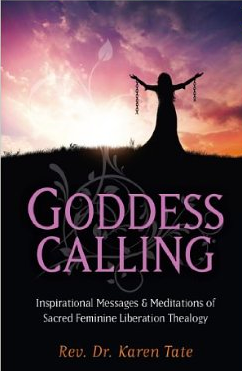
“Goddess is a Democrat!”
I am a staunch believer in the separation of Church and State, which is why from the first sentence of this book I was put off.
What in the Foreward purports itself to be a book about the sacred divine of feminine energy blasts its way onto the page with a ridiculous political statement. And the political diatribe did not end there but rather continued throughout the majority of the text with condemnation after condemnation of the Republican party and, largely, any form of conservatism the author could think to attack.
A political tirade does not make for a book designed to “create a regular gathering or service” for “anyone seeking to incorporate a feminine face of god within their spirituality”. If the intention of this book was for it to serve as a text for the resurgence of feminine spirituality in a religious practice, the intention gets bogged down, if not completely lost, in the swamp of political mud-slinging.
Through her approach to the topic, the author makes herself no better than those she condemns for intolerance. She distorts politics and religion for her own agenda.
Karen Tate seems to lack a concrete grasp of the historical nature of the ancient societies she exemplifies as ideals of the goddess culture. She repeatedly holds Ancient Rome up as a paragon of feminine divine because of the inclusion of prominent and important goddesses with in the pantheon, but she seems to neglect the fact that by Roman law women could never achieve full citizenship and, while allowed to own property and fund construction projects, they were denied the right to vote or hold office. In fact, a woman never achieved her majority and was legally under the control of her father her entire life, even after being bartered off in an arranged marriage. Hardly the paragon of feminine equality.
The goddesses Tate proclaims as paragons of women’s rights were either life-long virgins (Diana and Athena) or tied to domestic life (Hera and Hestia), a large leap from the rallying cry of women’s independence and equality. Of particularly interesting note is the goddess Athena. For centuries mythologists have discussed Athena’s denial of the feminine, her support of men over women when gender battles arise, her denial of her own sexuality and even the fact that she herself was born of no mother, but rather the literal brain-child of her father Zeus.
Goddess Calling is filled with sweeping generalizations lacking substance and support. Tate refers to “ancient people” as if they all held the same beliefs and their cultures stemmed from the same point of origin. Even a cursory look at history and mythology will prove this to be inaccurate.
The author seems to believe that all suffering has been imposed upon women by Christianity but seems to forget that Christianity itself was born from earlier theologies, including, but not limited to, Judaism and Roman and Greek mythologies.
A particular irritant to me was the author’s insistence on using words like “thealogy” and “herstory” instead of “theology” and “history”, clearly spellings not original to her, being part of a larger vocabulary of earlier feminist movements (consider “womyn” versus “women”). These respellings are designed to remove a perceived masculinity from the studies of religion and history, but these deliberate misspellings do more to demonstrate either an ignorance of etymology or a blindness to the application of grammatical gender, a concept not familiar to the English language but which is highly significant to the Latin and Greek languages she dismisses.
Let’s be clear: grammatical gender has no connection to sexuality or human physicality. And to be fair, histora, -ae is a Latin feminine noun.
Goddess Calling purports to be a book designed as a handbook for guidance during religious ceremonies for “women and like minded men” who wish to celebrate the feminine divine in the world. However, instead of focusing on feminine power and offering up new (or ancient) prayers and meditation, Tate self-indulgently recounts stories of her travels. How is this supposed to be of use to a ceremonial leader who is not herself Tate?
I looked forward to reading this book for the immense potential I saw in its premise. I was disappointed. Tate dramatically missed the mark here. Her political diatribe not only barely touches on the aspects of The Goddess she worships but also does a remarkable job of finger pointing and blaming all of woman-kind’s troubles on a political party against which she clearly hold a personal grudge.
I can only hope that Karen Tate’s church never seeks tax-exempt status as she would be far more suited to leading a political movement than a religious one.
I am sure there are those would would argue that modern religions are not removed from the political debate and therefore singling her out as breaking that boundary is unfair. To that argument I say, the patriarchal justification “an eye for an eye” is exactly what Tate is theoretically arguing against, so why exemplify it in her “teachings”.
Love elephant and want to go steady?
Sign up for our (curated) daily and weekly newsletters!
Editor: Renée Picard











Read 0 comments and reply